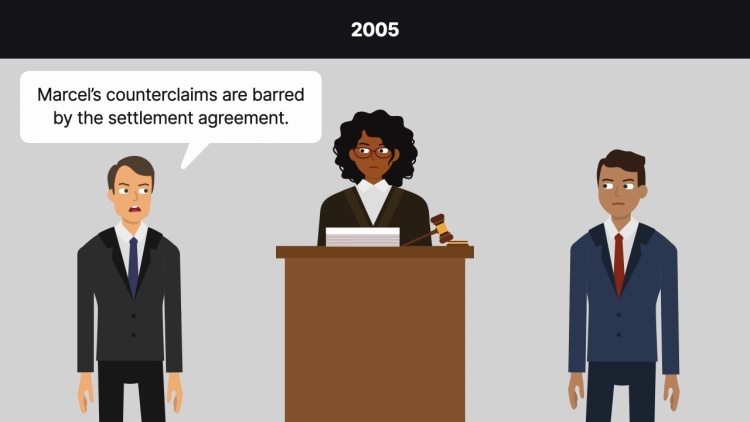Lucky Brand Dungarees v. Marcel Fashions Group
United States Supreme Court
140 S. Ct. 1589 (2020)

- Written by Kate Douglas, JD
Facts
Marcel Fashions Group, Inc. (Marcel) (plaintiff) and Lucky Brand Dungarees, Inc. (Lucky Brand) (defendant) both sold clothing. Marcel trademarked the phrase “Get Lucky.” Lucky Brand trademarked the phrase “Lucky Brand” and had other marks containing the word “lucky.” Lucky Brand also used the phrase “Get Lucky” in some of its marketing. In 2001, Marcel sued Lucky Brand, asserting that Lucky Brand’s use of the phrase “Get Lucky” violated Marcel’s trademark. The parties ultimately settled. Lucky Brand agreed not to use the phrase “Get Lucky,” and Marcel released all claims regarding Lucky Brand’s use of its own marks. In 2005, Lucky Brand sued Marcel for trademark violations. Marcel counterclaimed, asserting that Lucky Brand continued to use the phrase “Get Lucky” in violation of the prior settlement agreement. Marcel further claimed that Lucky Brand’s use of the phrases “Get Lucky” and “Lucky Brand” together was confusingly similar to Marcel’s mark and therefore infringed it. At the early stages of the litigation, Lucky Brand asserted that Marcel’s counterclaims were barred by the release in the 2001 action. However, Lucky Brand did not pursue that defense further. Marcel ultimately prevailed on the merits of its counterclaims. In 2011, Marcel sued Lucky Brand, asserting that Lucky Brand’s use of its own marks infringed Marcel’s “Get Lucky” mark. Marcel’s claims were based on conduct occurring after the 2005 action concluded. Lucky Brand argued that Marcel’s claims were barred by the release in the 2001 action. The district court agreed and dismissed the case. The Second Circuit vacated and remanded, holding that Lucky Brand was precluded from asserting its release defense because it could have pursued that defense fully in the 2005 action but did not. The United States Supreme Court granted cert.
Rule of Law
Issue
Holding and Reasoning (Sotomayor, J.)
What to do next…
Here's why 907,000 law students have relied on our case briefs:
- Written by law professors and practitioners, not other law students. 47,100 briefs, keyed to 996 casebooks. Top-notch customer support.
- The right amount of information, includes the facts, issues, rule of law, holding and reasoning, and any concurrences and dissents.
- Access in your classes, works on your mobile and tablet. Massive library of related video lessons and high quality multiple-choice questions.
- Easy to use, uniform format for every case brief. Written in plain English, not in legalese. Our briefs summarize and simplify; they don’t just repeat the court’s language.






